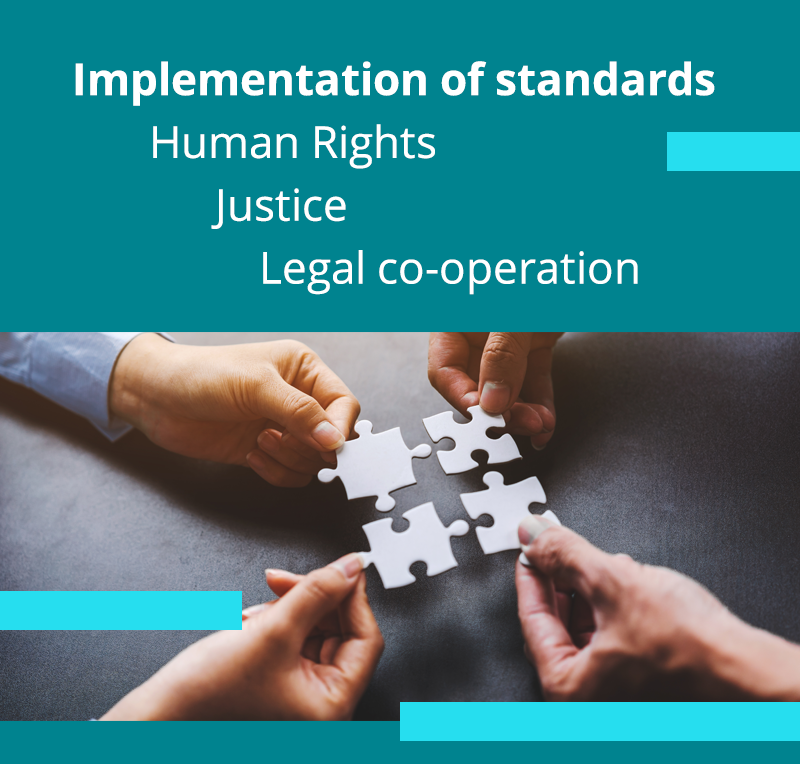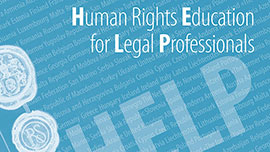Marina Romanova Visits Strasbourg
Ms Marina ROMANOVA, Administrative judge at Administrative district court of first instance in Riga (Latvia), participated recently in a study visit to the Council of Europe, including to the European Court of Human Rights. The visit was organised by the Human Rights National Implementation Division, Directorate of Human Rights, Directorate General of Human Rights and Rule of Law (DG I).
February 2016
Here are some impressions that Ms Romanova has shared with us after her visit to Strasbourg.
What did this study visit to Strasbourg mean to you ?
This study visit meant for me an excellent opportunity to participate in discussions with members of the Unit of human rights education for legal professionals (HELP), the Secretariat of the Consultative Council of European Judges, the European Commission for the Efficiency of Justice, as well as with the judge of the European Court of Human Rights elected in respect of Latvia, with the Latvian permanent representative to the Council of Europe and with lawyers from the Registry of the ECtHR. During this study visit I had a unique chance to gain a detailed and informal insight into the work of the Council of Europe and its institutions.
Could you mention some moments during the visit, which impressed you in particular? Why?
The hearing of the case Paradiso and Campanelli v. Italy that took place in the Grand Chamber impressed me very much. It is impossible to feel the atmosphere of hearings by watching them online. I liked the diversity of questions raised by judges. These were questions not only about facts and about law. Some of them were philosophical.
To what extent this study visit has been useful for you? What impact can it have on yours and your colleagues’ day-by-day work?
This study visit was very useful for me. In my day-by-day work I do apply European Convention on Human Rights. Thus, presentations on application of some Articles of the Convention are extremely useful for national judges. During the study visit a lawyer of the Registry of the Court of Human Rights presented us new possibilities offered by HUDOC. Now it will make us much easier to search for information in HUDOC. Moreover, our study visit in general was inspiring thanks to the communication with qualified professionals and wonderful Strasbourg atmosphere.
What other activities for legal professionals – judges, prosecutors, lawyers - could be useful to be organised by the Council of Europe in your country?
Prosecutors and lawyers could provide more detailed and competent opinion on activities that could be useful for them. I am sure that they could be interested in study visits to the European Court of Human Rights focusing on specific currently important and practical topics. As regards judges, more study visits and practical trainings would be much appreciated. Moreover, the Council of Europe could organise an annual conference on most relevant legal issues that crystallise from the latest judgements and decisions of the European Court of Human Rights with respect to Latvia.
Is there a mechanism through which you can express your need for professional training?
There is such an informal mechanism. We can express our needs for professional training to the Latvian judicial training centre, suggest a lecturer and propose a list of topics we are interested in.
In your capacity as a judge, how would you evaluate the process of implementation of the European Convention on Human Rights at the national level in Latvia?
I am an administrative judge; therefore I would like to narrow the scope of the national level to administrative courts. I would evaluate this process at the level of Latvian administrative courts as effective. This opinion is based on the case law of the European Court of Human Rights in many cases, such as Melnītis v. Latvia, Savičs v. Latvia, Ignats v. Latvia or Iļjins v. Latvia.




